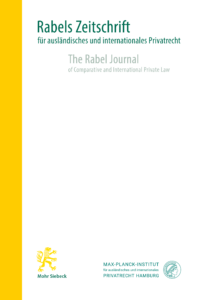Journal of Private International Law 20th Anniversary Conference – Programme and Registration
The 20th Anniversary Conference of the Journal of Private International Law will take place at the Faculty of Laws of University College London between 11 and 13 September 2025.A
The conference organizers, Ugljesa Grusic (UCL) and Alex Mills (UCL), and the editors of the Journal, Paul Beaumont (University of Stirling) and Jonathan Harris (King’s College London), are pleased to announce that the conference programme is now available on the conference website.
The conference will include, in the customary manner, a mixture of parallel panel sessions (on Thursday afternoon and Saturday morning) and plenary sessions (on Friday).
A limited number of non-speaker tickets and conference dinner tickets are available via the conference website, with early bird fees until 1 July 2025.



 Issue 2 of RabelsZ 89 (2025) is out. All content is
Issue 2 of RabelsZ 89 (2025) is out. All content is